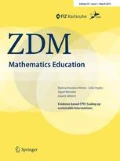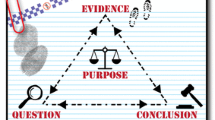Abstract
This paper addresses how students explore, construct, validate and use statistical models when facing situations designed from a socio-critical perspective. The case study used is a statistics lesson designed by a statistics teacher and a researcher. The lesson centers on nutritional information and was implemented in a 7th-grade classroom at a public school in a Northwest Colombian city. In small groups, students gathered their own data, and subsequently organized and analyzed the data, and presented their findings to the class. The main sources of data were students’ discourse in the classroom, students’ artifacts and the researcher’s journal. The findings describe a route in which students explore, construct, use, and validate their models. The results elaborate the technological and the reflective knowledge that took place in the model building activity.

Similar content being viewed by others
Notes
The video is promoted by a private organization and it is available in the link https://www.youtube.com/watch?v=N00s3iSo0wE.
Names are pseudonyms to protect the identity of participants under Colombian research law.
References
Aridor, K., & Ben-Zvi, D. (2017). The co-emergence of aggregate and modelling reasoning. Statistics Education Research Journal, 16(2), 38–63.
Barbosa, J. (2006). Mathematical modelling in classroom: A socio-critical and discursive perspective. ZDM The International Journal on Mathematics Education, 38(3), 293–301.
Campos, C. R. (2016). La educación estadística y la educación crítica [Statistics education and critical education]. In Segundo Encuentro Colombiano de Educación Estocástica (2 ECEE). Colombia: Bogotá.
Cobb, G., & Moore, D. (1997). Mathematics, statistics, and teaching. American Mathematical Monthly, 104, 801–823.
Doerr, H., delMas, R., & Makar, K. (2017). A modeling approach to the development of students’ informal inferential reasoning. Statistics Education Research Journal, 16(2), 86–115.
English, L. D. (2012). Data modelling with first-grade students. Educational Studies in Mathematics, 81(1), 15–30.
Garfield, J., & Ben-Zvi, D. (2008). Learning to reason about statistical models and modelling. In J. Garfield & D. Ben-Zvi (Eds.), Developing students’statistical reasoning: Connecting research and teaching practice (pp. 143–163). New York: Springer.
Gould, R., Bargagliotti, A., & Johnson, T. (2017). An analysis of secondary teachers’ reasoning with participatory sensing data. Statistics Education Research Journal, 16(2), 305–334.
Gould, R., Johnson, T., Moncada-Machado, S., & Molyneux, J. (2015). Modeling with “big data” in secondary schools. An exploratory study. In D. Ben-Zvi & K. Makar (Eds.), Reasoning about models and modelling in the context of informal statistical inference (pp. 176–188). Paderborn: SRTL-9.
Hernández-Carrera, R. (2014). Qualitative research through interviews: Its analysis by Grounded Theory. Cuestiones Pedagógicas, 23, 187–210.
Kaiser, G., & Sriraman, B. (2006). A global survey of international perspectives on modelling in mathematics education. ZDM The International Journal on Mathematics Education, 38(3), 302–310.
Konold, C., Finzer, W., & Kreetong, K. (2017). Modeling as a core component of structuring data. Statistics Education Research Journal, 16(2), 191–212.
Lerman, S. (2001). Cultural, discursive psychology: a sociocultural approach to studying the teaching and learning of mathematics. Educational Studies in Mathematics, 46, 87–113.
Makar, K., & Rubin, A. (2009). A framework for thinking about informal statistical inference. International Electronic Journal of Mathematics Education, 2(3), 82–105.
McCullagh, P. (2002). What is a statistical model? The Annals of Statistics, 30(5), 1225–1310.
Pfannkuch, M., Budgett, S., Fewster, R., Fitch, M., Pattenwise, S., Wild, C., & Ziedins, I. (2016). Probability modeling and thinking: What can we learn from practice? Statistics Education Research Journal, 15(2), 11–37.
Radford, L. (2006). Elementos de una teoría cultural de la objetivación [Elements of a Cultural Theory of Objectification]. Revista Relime, Número Especial, 103–129.
Radford, L. (2016). The theory of objectification and its place among sociocultural research in mathematics education. International Journal for Research in Mathematics Education (RIPEM), 6(2), 187–206.
Radford, L. (2018). The emergence of symbolic algebraic thinking in primary school. In C. Kieran (Ed.), Teaching and learning algebraic thinking with 5- to 12-year-olds: The global evolution of an emerging field of research and practice (pp. 3–25). New York: Springer.
Skovsmose, O. (1990). Mathematical education and democracy. Educational Studies in Mathematics, 21(2), 109–128.
Skovsmose, O. (1992). Democratic competence and reflective knowing in mathematics. For the Learning of Mathematics, 12(2), 2–11.
Skovsmose, O. (1999). Hacia una filosofía de la educación matemática crítica [Towards a philosophy of critical mathematics education]. (P. Valero, Trad.) Bogotá: Una Empresa Docente (Trabajo original publicado en 1994).
Watson, J. M. (2007). Inference as prediction. Australian Mathematics Teacher, 63(1), 6–11.
Wild, C., & Pfannkuch, M. (1999). Statistical thinking in empirical enquiry (with discussion). International Statistical Review, 67(3), 223–265.
Acknowledgements
This research was carried out with financial support of Universidad de Antioquia Research Committee—CODI and Colciencias research Grant 438-2017. Special thanks to the reviewers for their meaningful and insightful suggestions in previous versions of this paper. Likewise, special thanks to Mónica Parra-Zapata for her priceless support in the data collection process, to Kenneth Hall and Jill Fielding-Wells for their invaluable support with helpful comments in the editing and to the incredible students for their openness and availability to participate in the study.
Author information
Authors and Affiliations
Corresponding author
Appendix
Rights and permissions
About this article
Cite this article
Zapata-Cardona, L. Students’ construction and use of statistical models: a socio-critical perspective. ZDM Mathematics Education 50, 1213–1222 (2018). https://doi.org/10.1007/s11858-018-0967-8
Accepted:
Published:
Issue Date:
DOI: https://doi.org/10.1007/s11858-018-0967-8




